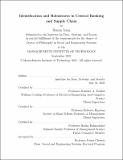Identification and Robustness in Central Banking and Supply Chain
Author(s)
Jiang, Bomin
DownloadThesis PDF (15.42Mb)
Advisor
Dahleh, Munther A.
Rigobon, Roberto
Terms of use
Metadata
Show full item recordAbstract
In this thesis, we study identification and robustness issues in central banking and supply chains. First, we present a methodology to identify multiple linear financial networks when only an aggregate outcome is observed, and use the method to assess financial networks among financial institutions in the United States. We discover that the data is better explained by a mix of distinct networks, each of which corresponds to a different transmission mechanism. Second, we investigate the effect of bounded uncertainty in central banking, and derive robust decision rules for central banking policymaking. When bounded uncertainty is passed through a conditional expectation channel, we find that committing not to use a policy tool is sometimes optimal for the central bank. An asset purchasing model and a forward guidance model are examined in depth to illustrate our point. Third, we study a stylized supply chain model where large aggregate shock hits and prices are not adjusted due to anti-price gouging laws. We show that individual producers, in this case, will not diversify for aggregate shock due to the externality of fixed prices. Multinational corporations, on the other hand, would still diversify their supply chain due to continuation value. Furthermore, a robustness analysis shows that individual producers will not diversify even when they adopt robust decision rules, but multinational corporations will further diversify their supply chain in this case. The first two chapters tackle the real-world challenge of financial systemic risk reflected by the 2008 financial crisis, and the proliferation of monetary policy tools thereafter. The third chapter tries to analyze the supply chain disruption caused by the outbreak of the Covid-19 global pandemic, and give policy suggestions based on our model.
Date issued
2021-09Department
Massachusetts Institute of Technology. Institute for Data, Systems, and SocietyPublisher
Massachusetts Institute of Technology